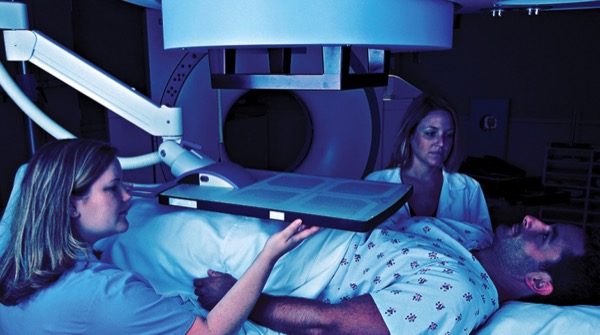
Chair of the Digestive Disease & Surgery Institute
Cleveland Clinic, Cleveland
This month’s report examines endoscopic surveillance frequency in patients with IBD who are at high risk for developing colorectal cancer, such as people with extensive colitis and inflammation or with primary sclerosing cholangitis. I also discuss new research on the effect of radiation treatment in patients with cancer who are simultaneously undergoing treatment for IBD.
The first study, on endoscopic surveillance, was published in June 2022 in Alimentary Pharmacology & Therapeutics, and then was featured as a hot topic at the December 2022 Advances in Inflammatory Bowel Diseases meeting. The bottom-line finding of the study is disturbing, which is why we chose to highlight it at the meeting.
Among people in Spain diagnosed with IBD who underwent at least one colonoscopy after their diagnosis, only 27% of colonoscopies occurred at a frequency that matched the recommendations of the European Crohn’s and Colitis Organisation (ECCO) based on a patient’s risk for developing CRC. This low adherence was true regardless of the risk for CRC. Patients who received colonoscopies the most often were most likely to have polyps caught early.
If a patient is in IBD remission and appears to be doing well, it might be tempting for their physician to delay a colonoscopy until it seems more justified. This study strongly supports doing more frequent surveillance for high-risk patients, even when everything seems fine.
The second study, a review of 21 articles published since 1990, explored whether IBD is an absolute contraindication to receiving radiation therapy in patients who also have cancer. Back in the early 1990s, gastroenterologists were concerned that the radiation doses used in cancer care would make IBD inflammation worse—thus, solving one problem by causing another. However, we had no hard data to determine if this was true because no prospective studies on this topic existed.
More than 30 years later, there’s still no definitive prospective study, but a study in the Journal of Gastrointestinal Oncology looks retrospectively at clinical evidence gathered to date. Very encouragingly, the researchers find little evidence that radiation during cancer treatment makes IBD symptoms worse. So, although we should always individualize care, in general these results support treating cancer and IBD simultaneously.
Speaking as a gastroenterologist, I think we’ve come a long way in treating IBD since 1990, so our patients now have more enduring remissions that are not affected by exposure to radiation. In addition, although I’m not a radiation oncologist, my understanding from conversations with colleagues is that radiation treatment is now more pinpointed than it used to be, which means people have less radiation exposure in the first place. Whatever the cause of these results, they are good news for our patients with IBD who also have cancer.
The Higher the CRC Risk, the Lower the Adherence?
(Aliment Pharmacol Ther 2022;55[11]:1402-1413)
This study includes 888 patients diagnosed with IBD from 2005 to 2008, who underwent at least one colonoscopy by 2020. Per the ECCO guidelines, patients at highest risk for developing CRC, such as those with primary sclerosing cholangitis (PSC) (the highest-risk group), should have a colonoscopy immediately following diagnosis and then every year. Patients with such conditions as post-inflammatory polyps or a family history of CRC (the medium-risk group) should have an initial colonoscopy and then additional colonoscopies every two to three years, while all others (the lowest-risk group) should have a colonoscopy every five years after their initial procedure.
The researchers stratified patients by their risk level and documented how many colonoscopies they received. Only 27% of patients fully adhered to ECCO screening guidelines (95% CI, 24%-29%), and adherence declined as risk level increased (odds ratio [OR] for adherence, 3.52; 95% CI, 2.46-5.04; P<0.001 and OR, 4.29; 95% CI, 2.41-7.64; P<0.001 for intermediate- and high- vs. low-risk groups). Adherence to the guidelines was associated with better detection of advanced lesions (hazard ratio, 3.59; 95% CI, 1.3-10.1; P=0.016).
Considerations for Bowel-Impacting Radiation and IBD-Associated Malignancies
(J Gastrointest Oncol 2022;13[5]:2565-2582)
This article is a synthesis of 21 studies of the impact of pelvic cancer radiation therapy (e.g., for colorectal carcinoma, anal carcinoma and prostate cancer) on patients who also have IBD.
In the past, IBD patients have been less likely to receive radiotherapy in areas near the bowel due to the lack of knowledge of potential toxicities and flares. The National Comprehensive Cancer Network guidelines rate active IBD as an absolute contraindication to external beam therapy for the treatment of prostate cancer and rate inactive ulcerative colitis as a relative contraindication.
Researchers combed through published articles on PubMed and screened all publications from January 1990 to June 2021, using applicable PRISMA scoping review guidelines. Relevant clinical studies, meta-analyses, case reports and reviews were included in the study. Reviews were included to better reflect the reasoning and recommendations of decision-guiding literature on the use of radiation therapy in the treatment of IBD.
The researchers found that radiation therapy can be safely administered concomitantly with IBD treatment, and detailed different types of radiation therapy protocols based on the specific cancer. For example, based on the literature the researchers recommended that people with colon cancer undergo total proctocolectomy with ileal pouch-anal anastomosis, and then receive conformational radiation therapy in a prone position.
They also suggested patients with rectal cancer should receive proton therapy rather than external beam radiation therapy, whereas high-dose rate brachytherapy appears to be the best radiation mode for people with prostate cancer.
The researchers concluded that IBD should not be categorized as an absolute contradiction to radiation therapy, given the lack of evidence for increased toxicities in the literature and advances in radiation therapy that have reduced radiation doses to the bowel. They added that more research is warranted but noted that it is clear that policies concerning the use of radiation therapy in IBD should be updated.
—Compiled and written by Marcus A. Banks
{RELATED-HORIZONTAL}

